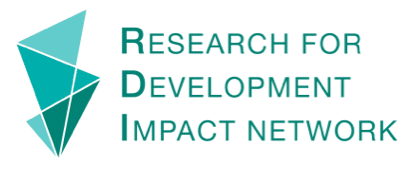Working collaboratively with people with disabilities will transform the research process; both mainstream and disability-specific initiatives will benefit. Research that is (generally) inclusive is well-planned, change (negative) narratives on disability, create a more inclusive society, build skills and bolster local DPOs.
Research is not just about evaluations and data-mining from the local community; research findings and recommendations can have huge impact on policies, programming and access to services. Ensure positive impact; empowering local DPOs to participate in decision-making, build capacity in people with disabilities, and entwine local solutions for sustainable development.
The RDI Network, Nossal Institute for Global Health, and CBM Australia collaborated together to provide advice and practical steps for practitioners, researchers and policymakers; guidance provides case studies, checklists, and tools to ensure inclusive practices in the research cycle
Together, we have created the following resources:
- Watch a Disability-inclusion Explainer Animation Video. This 2min animation explains the importance of disability inclusion in research and evaluation. Share with your team promote organisational change and conversation. (Video, 2min, Youtube)
- Read and use our practical guide, Research For All: Making Research Inclusive of People with Disabilities. This guidance document, including templates, checklists and practical tips addressing 1) The key principles of disability-inclusive development, 2) Ethical Considerations of disability-inclusive development, and 3) Best-practice in the research cycle. This document has been designed as an accessible and interactive PDF. This PDF can be read by (most) screen-readers, and includes internal links to navigate and ‘jump’ around the guide.
Prefer to watch videos?
The RDI Network, in collaboration with ACFID, delivered a series of three online webinars based on the practical guide, Research For All: Making Research Inclusive of People with Disabilities.
- Principles of Disability-Inclusive Development. Watch Part 1 on Youtube. Setting out the fundamental principles and ethical considerations of disability-inclusive development (DID) research. This includes an overview of the rights-based approach to disability, and its guidance in shaping development. With speakers; Jen Blyth (CBM Australia), Tessa Hillgrove (CBM Australia), and Laisa Vereti (Pacific Disability Forum). (1hr 4mins, video, Youtube)
-
Ethical processes and considerations in disability-inclusive research. Watch Part 2 on Youtube. Discussing the ethical considerations for designing inclusive research questions and methods, including when working with children with disabilities. This involves enabling and obtaining informed consent. With speakers; Ipul Powaseu (Papua New Guinea Assembly of Disabled Persons (PNGADP)), Lana Logma (Nossal Institute for Global Health), and Dr. Manjella Marella (Nossal Institute for Global Health). (1hr 1min, video, Youtube)
-
Best-practice across the research cycle. Watch Part 3 on Youtube. Detailing the key steps and processes for ethically involving people with disabilities throughout the four main phases of the research process: planning, design, implementation, and dissemination. With speakers; Helen Fernandez (TEAR Australia), Lana Woolf (Edge Effect), and Marc Purcell (ACFID). (1hr 5mins, video, Youtube)
Other links that may also be useful:
- Disability-inclusive Practice and Research: COVID-19 & Beyond. What work has been realised to ensure people with disabilities can access their human rights during the #COVID19 pandemic? With speakers; Mika Kontiainen, Director, Disability Section, DFAT; Setareki S Macanawai, CEO, Pacific Disability Forum; Samantha French, Senior Policy Officer PWDA, ADDC Executive Committee member, PDF Board Member, Pacific Women with Disability Committee member and Asia-Pacific Disabled Peoples Organisations United Vice Chair; and moderator, Kylie Shae OAM, Founder and CEO of Motivation Australia (1hr 28mins, video, Youtube)
-
Disability Inclusion and M&E Webinar. This webinar is led by the Australian Disability + Development Consortium (ADDC). Watch this webinar to learn more about the approaches, methods and practical applications of ensuring monitoring and evaluation is capturing the whole story with respect to inclusion of and impacts for people with disabilities. (59mins, video, Youtube)



